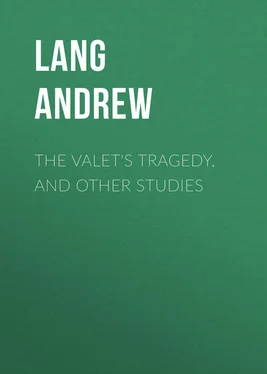Andrew Lang - The Valet's Tragedy, and Other Studies
Здесь есть возможность читать онлайн «Andrew Lang - The Valet's Tragedy, and Other Studies» — ознакомительный отрывок электронной книги совершенно бесплатно, а после прочтения отрывка купить полную версию. В некоторых случаях можно слушать аудио, скачать через торрент в формате fb2 и присутствует краткое содержание. Издательство: Иностранный паблик, Жанр: foreign_antique, foreign_prose, на английском языке. Описание произведения, (предисловие) а так же отзывы посетителей доступны на портале библиотеки ЛибКат.
- Название:The Valet's Tragedy, and Other Studies
- Автор:
- Издательство:Иностранный паблик
- Жанр:
- Год:неизвестен
- ISBN:нет данных
- Рейтинг книги:4 / 5. Голосов: 1
-
Избранное:Добавить в избранное
- Отзывы:
-
Ваша оценка:
- 80
- 1
- 2
- 3
- 4
- 5
The Valet's Tragedy, and Other Studies: краткое содержание, описание и аннотация
Предлагаем к чтению аннотацию, описание, краткое содержание или предисловие (зависит от того, что написал сам автор книги «The Valet's Tragedy, and Other Studies»). Если вы не нашли необходимую информацию о книге — напишите в комментариях, мы постараемся отыскать её.
The Valet's Tragedy, and Other Studies — читать онлайн ознакомительный отрывок
Ниже представлен текст книги, разбитый по страницам. Система сохранения места последней прочитанной страницы, позволяет с удобством читать онлайн бесплатно книгу «The Valet's Tragedy, and Other Studies», без необходимости каждый раз заново искать на чём Вы остановились. Поставьте закладку, и сможете в любой момент перейти на страницу, на которой закончили чтение.
Интервал:
Закладка:
Another letter of Marsilly to Arlington, only dated Jeudi, avers that he can never repay Arlington for his extreme kindness and liberality. ‘No man in England is more devoted to you than I am, and shall be all my life.‘*
*State Papers, France, vol. 125, 106.
On the very day when Marsilly drafted for Charles his own commission to treat with Zurich for a Protestant alliance against France, Charles himself wrote to his sister, Madame (Henriette d’Orleans). He spoke of his secret treaty with France. ‘You know how much secrecy is necessary for the carrying on of the business, and I assure you that nobody does, nor shall, know anything of it here, but myself and that one person more, till it be fit to be public.‘* (Is ‘that one person’ de la Cloche?)
*Madame, by Julia Cartwright, p. 275.
Thus Marsilly thought Charles almost engaged for the Protestant League, while Charles was secretly allying himself with France against Holland. Arlington was probably no less deceived by Charles than Marsilly was.
The Bishop of London’s share in the dealing with Zurich is obscure.
It appears certain that Arlington was not consciously deceiving Marsilly. Madame wrote, on February 12, as to Arlington, ‘The man’s attachment to the Dutch and his inclination towards Spain are too well known.‘* Not till April 25, 1669, does Charles tell his sister that Arlington has an inkling of his secret dealings with France; how he knows, Charles cannot tell.** It is impossible for us to ascertain how far Charles himself deluded Marsilly, who went to the Continent early in spring, 1669. Before May 15/25 1669, in fact on April 14, Marsilly had been kidnapped by agents of Louis XIV., and his doom was dight.
*Madame, by Julia Cartwright, p. 281.
**Ibid. p. 285.
Here is the account of the matter, written to – by Perwich in Paris:
W Perwich to —
Paris, May 25, ‘69.
Honored Sir,
The Cantons of Switzerland are much troubled at the French King’s having sent 15 horsemen into Switzerland from whence the Sr de Maille, the King’s resident there, had given information of the Sr Roux de Marsilly’s being there negociating the bringing the Cantons into the Triple League by discourses much to the disadvantage of France, giving them very ill impressions of the French King’s Government, who was BETRAYED BY A MONK THAT KEPT HIM COMPANY and intercepted by the said horsemen brought into France and is expected at the Bastille. I believe you know the man… I remember him in England.
Can this monk be the monk who went mad in prison at Pignerol, sharing the cell of Mattioli? Did he, too, suffer for his connection with the secret? We do not know, but the position of Charles was awkward. Marsilly, dealing with the Swiss, had come straight from England, where he was lie with Charles’s minister, Arlington, and with the Dutch and Spanish ambassadors. The King refers to the matter in a letter to his sister of May 24, 1669 (misdated by Miss Cartwright, May 24, 1668.)*
‘You have, I hope, received full satisfaction by the last post in the matter of Marsillac [Marsilly], for my Ld. Arlington has sent to Mr. Montague [English ambassador at Paris] his history all the time he was here, by which you will see how little credit he had here, and that particularly my Lord Arlington was not in his good graces, because he did not receive that satisfaction, in his negotiation, he expected, and that was only in relation to the Swissers, and so I think I have said enough of this matter.’
*Madame, by Julia Cartwright, p. 264.
Charles took it easily!
On May 15-25 Montague acknowledged Arlington’s letter to which Charles refers; he has been approached, as to Marsilly, by the Spanish resident, ‘but I could not tell how to do anything in the business, never having heard of the man, or that he was employed by my Master [Charles] in any business. I have sent you also a copy of a letter which an Englishman writ to me that I do not know, in behalf of Roux de Marsilly, but that does not come by the post,’ being too secret.*
*State Papers, France, vol. 126.
France had been well informed about Marsilly while he was in England. He then had a secretary, two lackeys, and a valet de chambre, and was frequently in conference with Arlington and the Spanish ambassador to the English Court. Colbert, the French ambassador in London, had written all this to the French Government, on April 25, before he heard of Marsilly’s arrest.*
*Bibl. Nat., Fonds Francais, No. 10665.
The belief that Marsilly was an agent of Charles appears to have been general, and, if accepted by Louis XIV., would interfere with Charles’s private negotiations for the Secret Treaty with France. On May 18 Prince d’Aremberg had written on the subject to the Spanish ambassador in Paris. Marsilly, he says, was arrested in Switzerland, on his way to Berne, with a monk who was also seized, and, a curious fact, Marsilly’s valet was killed in the struggle. This valet, of course, was not Dauger, whom Marsilly had left in England. Marsilly ‘doit avoir demande la protection du Roy de la Grande Bretagne en faveur des Religionaires (Huguenots) de France, et passer en Suisse AVEC QUELQUE COMMISSION DE SA PART.’ D’Aremberg begs the Spanish ambassador to communicate all this to Montague, the English ambassador at Paris, but Montague probably, like Perwich, knew nothing of the business any more than he knew of Charles’s secret dealings with Louis through Madame.*
*State Papers, France, vol. 126.
To d’Aremberg’s letter is pinned an unsigned English note, obviously intended for Arlington’s reading.
‘Roux de Marsilly is still in the Bastille though they have a mind to hang him, yet they are much puzzled what to do with him. De Lionne has beene to examine him twice or thrice, but there is noe witnes to prove anything against him. I was told by one that the French king told it to, that in his papers they find great mention of the DUKE OF BUCKS: AND YOUR NAME, and speak as if he were much trusted by you. I have enquired what this Marsilly is, and I find by one Mr. Marsilly that I am acquainted withall, and a man of quality, that this man’s name is onely Roux, and borne at Nismes and having been formerly a soldier in his troope, ever since has taken his name to gain more credit in Switserland where hee, Marsilly, formerly used to bee employed by his Coll: the Mareschall de Schomberg who invaded Switserland.’
We next find a very curious letter, from which it appears that the French Government inclined to regard Marsilly as, in fact, an agent of Charles, but thought it wiser to trump up against him a charge of conspiring against the life of Louis XIV. On this charge, or another, he was executed, while the suspicion that he was an agent of English treachery may have been the real cause of the determination to destroy him. The Balthazar with whom Marsilly left his papers is mentioned with praise by him in his paper for Arlington, of December 27, 1668. He is the General who should have accompanied Marsilly to the Diet.
The substance of the letter (given in full in Note I.) is to the following effect. P. du Moulin (Paris, May 19-29, 1669) writes to Arlington. Ever since Ruvigny, the late French ambassador, a Protestant, was in England, the French Government had been anxious to kidnap Roux de Marsilly. They hunted him in England, Holland, Flanders, and Franche-Comte. As we know from the case of Mattioli, the Government of Louis XIV. was unscrupulously daring in breaking the laws of nations, and seizing hostile personages in foreign territory, as Napoleon did in the affair of the Duc d’Enghien. When all failed, Louis bade Turenne capture Roux de Marsilly wherever he could find him. Turenne sent officers and gentlemen abroad, and, after four months’ search, they found Marsilly in Switzerland. They took him as he came out of the house of his friend, General Balthazar, and carried him to Gex. No papers were found on him, but he asked his captors to send to Balthazar and get ‘the commission he had from England,’ which he probably thought would give him the security of an official diplomatic position. Having got this document, Marsilly’s captors took it to the French Ministers. Nothing could be more embarrassing, if this were true, to Charles’s representative in France, Montague, and to Charles’s secret negotiations, also to Arlington, who had dealt with Marsilly. On his part, the captive Marsilly constantly affirmed that he was the envoy of the King of England. The common talk of Paris was that an agent of Charles was in the Bastille, ‘though at Court they pretend to know nothing of it.’ Louis was overjoyed at Marsilly’s capture, giving out that he was conspiring against his life. Monsieur told Montague that he need not beg for the life of a would-be murderer like Marsilly. But as to this idea, ‘they begin now to mince it at Court,’ and Ruvigny assured du Moulin ‘that they had no such thoughts.’ De Lyonne had seen Marsilly and observed that it was a blunder to seize him. The French Government was nervous, and Turenne’s secretary had been ‘pumping’ several ambassadors as to what they thought of Marsilly’s capture on foreign territory. One ambassador replied with spirit that a crusade by all Europe against France, as of old against the Moslems, would be necessary. Would Charles, du Moulin asked, own or disown Marsilly?
Читать дальшеИнтервал:
Закладка:
Похожие книги на «The Valet's Tragedy, and Other Studies»
Представляем Вашему вниманию похожие книги на «The Valet's Tragedy, and Other Studies» списком для выбора. Мы отобрали схожую по названию и смыслу литературу в надежде предоставить читателям больше вариантов отыскать новые, интересные, ещё непрочитанные произведения.
Обсуждение, отзывы о книге «The Valet's Tragedy, and Other Studies» и просто собственные мнения читателей. Оставьте ваши комментарии, напишите, что Вы думаете о произведении, его смысле или главных героях. Укажите что конкретно понравилось, а что нет, и почему Вы так считаете.











